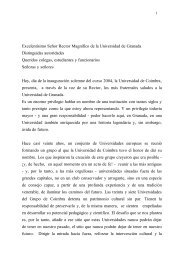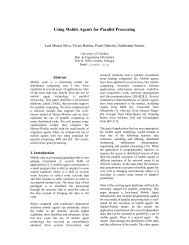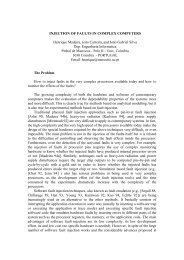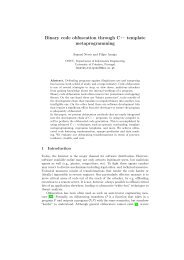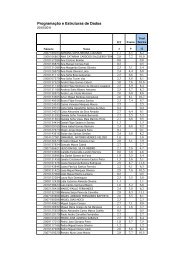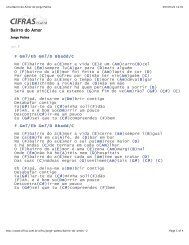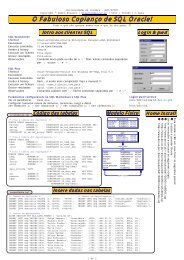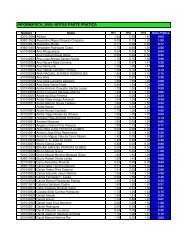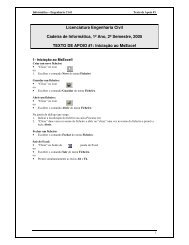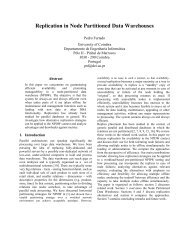WiMax Operator's Manual
WiMax Operator's Manual
WiMax Operator's Manual
You also want an ePaper? Increase the reach of your titles
YUMPU automatically turns print PDFs into web optimized ePapers that Google loves.
CHAPTER 9 ■ NETWORK SECURITY 189<br />
compensatory changes in the output voltage. Constant voltage transformers are marginally<br />
more reliable than switched tap autoformers, but they also tend to be more expensive.<br />
A better solution is an uninterruptible power supply (UPS), which is always on and is<br />
series-connected between the wall power and the devices being powered. Carrier-grade UPSs<br />
are examples of active power-conditioning devices. Such a unit usually consists of an isolation<br />
transformer interfacing with the wall current, an array of rectifiers that transform the alternating<br />
current into direct current, a bank of storage batteries to hold the DC charge, and a set of<br />
high-frequency solid state switches that converts the DC back into 50- or 60-cycle AC. Higherquality<br />
UPSs have provisions for maintaining a steady output voltage regardless of input<br />
voltage and also perform power factor correction, a process that eliminates harmonics in the<br />
output of the UPS caused by reactive electrical loads associated with switching power supplies<br />
in computers, with cathode-ray tube flyback circuits, and with most electrical motors.<br />
The better UPSs produce a smooth sine wave output, and lower-quality units produce a<br />
coarse, stair-step waveform. Since stair-step waves are rich in noise and distortion components,<br />
they are undesirable.<br />
Some UPSs recently introduced into the marketplace utilize fuel cells either in lieu of batteries<br />
or to supplement them. Although generalizations must be made with caution in this<br />
area, it is safe to say that most types of fuel cells produce several times the amount of energy<br />
per kilogram as most types of secondary batteries, though the lowest energy density fuel cells<br />
and the highest energy density batteries almost overlap in this regard. Fuel cells are currently<br />
very expensive, minimally $5,000 per kilowatt, but prices may begin to decline in the near<br />
future. Fuel cell backup power may begin to become the norm toward the end of the decade.<br />
High-velocity flywheel generators are also beginning to appear in some central offices for providing<br />
highly reliable, though relatively short-term, backup power.<br />
The central office facilities may also use backup generators. In most cases, these will use<br />
ordinary diesel or gasoline reciprocating engines, but a growing trend is to use devices called<br />
microturbines, which usually run on natural gas. Microturbines are made by such firms as Capstone,<br />
Allied Signal, and Ingersoll-Rand, and they are derived from the turbine designs used in<br />
jet aircraft. Currently microturbines are much more expensive than diesel engines.<br />
Diesel generators should be routinely tested because often diesel engines will fail to start<br />
when they have not been operated recently.<br />
In all cases, backup power must come on automatically and instantaneously in the event<br />
of a power failure. The subscriber should experience no interruption of service whatsoever.<br />
Cyberwarfare<br />
Whole books have been written on the subject of software-based network sabotage, and they<br />
will continue to be written simply because hacker tools and utilities are continuing to evolve.<br />
In this section I can suggest only the rudiments of a policy for dealing with such attacks.<br />
Operators of public networks have a greater obligation to secure their operations against<br />
hacks and cybersabotage than do ordinary businesses because the public depends on the services<br />
they provide. Above all, the network operator is selling reliability, and system downtime<br />
attributable to hacks is intolerable.<br />
The problem in meeting security requirements on the part of a network operator is that<br />
network security is a full-time job. Network security officers in large enterprises must spend a<br />
considerable portion of their waking hours lurking around hacker Web sites simply to keep<br />
abreast of developments, and of course they must also familiarize themselves with the torrent



